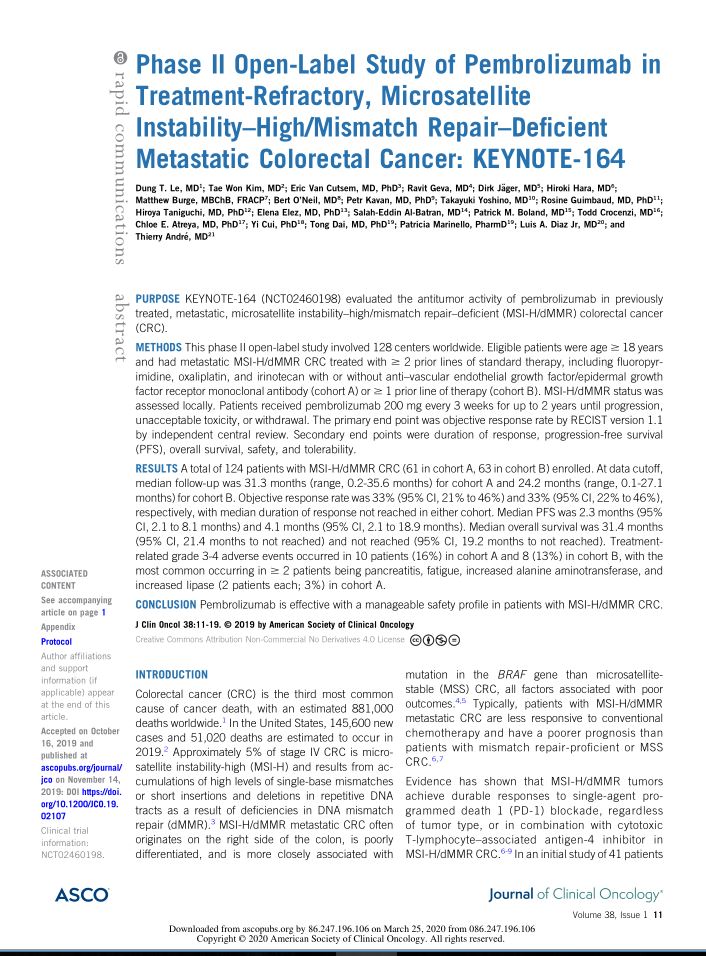MSI tumors (for Microsatellites Instability) are a type of tumors with genomic alterations due to a defect in the DNA repair system. To better understand the origin of these cancers and the consequences of their genomic features, especially on anti-tumor treatments, SiRIC Curamus, MSI and Cancer research team at the Saint-Antoine Research Center and the film director Cyprien Bisot present this popularized video 👇
Category: MSI vulgarisé
ASCO 2020 – Plenary session – Pr Thierry André
ASCO Annual Congress – Plenary session – Pr Thierry André
The Congress of the American Society of Clinical Oncology (ASCO) will be held this year in unprecedented conditions. The three days of scientific presentations will take place virtually from May 29 to 31. A total of 5,290 communications are scheduled. Among them, 394 will be presented by teams of which at least one of the authors is affiliated with a French entity (public or private).
French research represented in all the categories of the scientific congress.
As part of the Plenary Sessions, the most prestigious category and which has only 5 presentations, Professor Thierry André, clinician working at Saint-Antoine Hospital (Assistance Publique-Hôpitaux de Paris), will present the work on research undertaken in as part of treatment strategies in metastatic colorectal cancer.
Pembrolizumab in Colorectal Cancer – Stage IV MSI-H – KEYNOTE-164 (NCT02460198)
Phase II Open-Label Study of Pembrolizumab in Treatment-Refractory, Microsatellite Instability–High/Mismatch Repair–Deficient Metastatic Colorectal Cancer: KEYNOTE-164
Le DT, Kim TW, Van Cutsem E, Geva R, Jäger D, Hara H, Burge M, O’Neil B, Kavan P, Yoshino T, Guimbaud R, Taniguchi H, Elez E, Al-Batran SE, Boland PM, Crocenzi T, Atreya CE, Cui Y, Dai T, Marinello P, Diaz LA Jr, André T.
J Clin Oncol. 2020 Jan 1;38(1):11-19
RESUME
Colorectal cancer (CRC) is the 3rd leading cause of cancer death worldwide. It is responsible for more than 16,000 deaths per year in France. 5% of metastatic CRCs present an MSI (microsatellite instability) tumor phenotype related to a deficiency in the DNA mismatch repair system (dMMR). It has recently been shown that newer immunotherapy drugs (immune checkpoint inhibitors) are particularly effective in patients whose cancer has the MSI/dMMR phenotype. Thus pembrolizumab (anti-PD1 antibodies) has been approved by the American authorities (FDA: Food and Drug Administration) for the treatment of patients with metastatic MSI/dMMR CCR resistant to conventional treatments, based on preliminary data from the KEYNOTE-164 study.
This publication presents the complete results of the KEYNOTE-164 study. This is a Phase 2 study that included patients with metastatic MSI/dMMR CRC previously treated with a minimum of two lines (Cohort A) or one line of standard therapy (Cohort B). Patients received pembrolizumab 200 mg intravenous every 3 weeks until unacceptable progression or toxicity, for a maximum total of 2 years.
124 patients were included. Respectively 44% and 30% of patients in cohorts A (N=61) and B (N=63) had received more than 3 lines of treatment previously, and more than half of the patients in each cohort had an impaired performance index. With a median follow-up of 31 months (cohort A) and 24 months (cohort B), the objective response rate (defined as more than 30% reduction in tumour mass) was 33% in each of the 2 cohorts. The median duration of response was not reached (time from first documentation of response to tumour progression or death). The median overall survival was 31 months in cohort A and was not reached in cohort B. Treatment had to be discontinued in 2 patients in each cohort due to side effects (hepatic cytolysis, pneumonitis). 16% and 13% of patients in cohorts A and B respectively experienced treatment-related side effects, including dysthyroidism and colitis.
Updated data from the KEYNOTE-164 study confirms that immunotherapy is an effective therapeutic strategy, with lasting clinical benefit, in patients with metastatic MSI/dMMR CRC.
By Dr Romain COHEN
Treatment of gastrointestinal MSI cancers by immuno-oncology
How to Improve the Results With IO Agents in MSI GI Cancer?
https://oncologypro.esmo.org/content/download/231632/3918938/version/1/file/WORLDGI2019_76_andre.pdf
[ESMO 2019] Efficacy of PD-1 Inhibitors Confirmed in the Treatment of “MSI” Tumours
The pooled analysis of two studies, KEYNOTE-164 and KEYNOTE-168, in which Pr Thierry André, Head of the Digestive Oncology Department at the Saint-Antoine AP-HP Hospital, participated, confirms the exceptional efficacy of pembrolizumab (anti-PD1 antibodies) in the treatment of unstable micro satellite cancers (MSI), rare colorectal cancers that occur either in a hereditary context of Lynch syndrome or spontaneously without any particular environment with an incidence that increases with age. This particular form, characterized by abnormalities in DNA repair, promotes the formation and development of cancer cells. To date, MSI status is the best predictor of response to PD-1 inhibitors. These data will be presented orally at the ESMO congress on Monday, September 30, 2019.
More information : https://www.aphp.fr/contenu/esmo-2019-lefficacite-des-inhibiteurs-de-pd-1-confirmee-dans-le-traitement-des-tumeurs-msi
Source:
Pembrolizumab in microsatellite instability high cancers: updated analysis of the phase 2 KEYNOTE-164 and KEYNOTE-158 studies. 1174O – Lecture time: 10:15 – 10:30
L. Diaz, D. Le, M. Maio, P. Ascierto, R. Geva, D. Motola-Kuba, T. André, E. Van Cutsem, M. Gottfried, E. Elez, J.-P. Delord, D. Jäger, T.W. Kim, R. Guimbaud, T. Yoshino, M. Chen, K. Norwood, P. Marinello, A. Marabelle.
